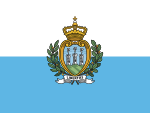San Marino ( SAN mə-REE-noh, Italian: [sam maˈriːno]; Romagnol: San Maréin or San Maroin), officially the Republic of San Marino (Italian: Repubblica di San Marino) and also known as the Most Serene Republic of San Marino (Italian: Serenissima Repubblica di San Marino), is a European microstate and country enclaved by Italy. Located on the northeastern side of the Apennine Mountains, San Marino is the fifth-smallest country in the world and covers a land area of just over 61 km2 (23+1⁄2 sq mi), with a population of 33,562.San Marino is a landlocked country; however, its northeastern end is within ten kilometres (six miles) of the Italian city of Rimini on the Adriatic coast. The nearest airport is also in Italy. The country's capital city, the City of San Marino, is located atop Monte Titano, while its largest settlement is Dogana within the largest municipality of Serravalle. San Marino's official language is Italian.
The country derives its name from Saint Marinus, a stonemason from the then-Roman island of Rab in present-day Croatia. Born in AD 275, Marinus participated in the rebuilding of Rimini's city walls after their destruction by Liburnian pirates. Marinus then went on to found an independently ruled monastic community on Monte Titano in AD 301; thus, San Marino lays claim to being the oldest extant sovereign state, as well as the oldest constitutional republic.Uniquely, San Marino's constitution dictates that its democratically elected legislature, the Grand and General Council, must elect two heads of state every six months. Known as captains regent, the two heads of state serve concurrently and with equal powers until their term expires after six months.
The country's economy is mainly based on finance, industry, services, retail, and tourism. It is one of the wealthiest countries in the world in GDP per capita, with a figure comparable to the most developed European regions. Despite this fact, ranking 44th, its Human Development Index score is the lowest in Western Europe. Its health care system ranked 3rd in the first ever World Health Organization analysis of the world's health systems.




